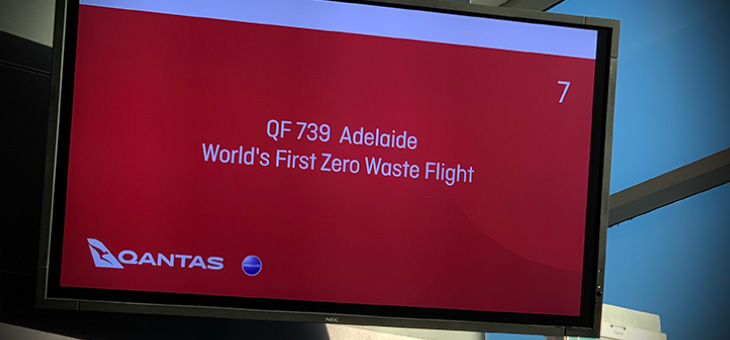In an industry striving to become more sustainable, Qantas yet again sets the pace with the world’s first zero-waste flight in a test-run from Sydney to Adelaide.
As part of The Bowerbird Project, Qantas hopes to eliminate 100 million pieces of single-use plastic from flights by the end of 2021, reducing its total waste by 75 per cent.
It’s one of Australia’s single biggest waste-reduction initiatives in which Qantas and Jetstar will replace 45 million plastic cups, 30 million cutlery sets, 21 million coffee cups and four million headrest covers with ‘green’ alternatives.
It’s doing so with the help of Australia’s leading eco-friendly packaging company, BioPak, whose certified compostable packaging made from plants and responsibly sourced renewable materials will be commercially composted in Adelaide and will replace a range of single-use plastics and disposable food packaging items on the flight.
“We are delighted to team up with Qantas Group in what is an unprecedented step forward in fighting the war on waste,” said BioPak chief Gary Smith.
“This is the most ambitious waste reduction target of any major airline globally, and we are truly excited to be at the forefront in providing state-of-the-art, eco-friendly products that solve the impending issue of single-use plastics.
“Innovation is at the heart of what we do. For more than a decade, we have been working with companies across Australia and NZ to provide a viable solution to our current waste crisis, and it is wonderful to see Qantas Group join our ever-expanding network.”
All inflight products on flight QF739 from Sydney to Adelaide were either composted, recycled or reused, the airline said.
“We want to give customers the same level of service they currently enjoy, but without the amount of waste that comes with it,” said Qantas Domestic chief Andrew David.
“In the process of carrying over 50 million people every year, Qantas and Jetstar currently produce an amount of waste equivalent to 80 fully laden Boeing 747 jumbo jets.”
He added that this particular flight would typically produce 34 kilograms of waste or 150 tonnes annually.
“This includes plastic cutlery, cups, bottles and food containers, paper napkins, aluminium cans and other single-use items that occupy the meal tray,” states a Qantas media release.
Around 1000 single-use plastic items were swapped with sustainable alternatives or removed altogether, including individually packaged servings of milk and Vegemite.
“Qantas’s Green Team cabin crew distributed meals in containers made from sugar cane with cutlery made from crop starch, both of which are compostable and were supplied by Qantas partner BioPak,” said Qantas in statement.
“Following the meal service, cabin crew collected the waste and sorted it into different streams – reuse, recycle or compost. Qantas partner Suez, which disposes of the airline’s waste, is composting organic material to be used on farms and gardens. Recyclable plastics will be recycled into new products; non-recyclable plastics will be used to create a type of non-fossil fuel called PEF.”
Mr David said there would be a cost to implement all new products and processes, but the carrier had no intention of changing the quality of its service or passing costs on to customers.
“Ultimately, it’s the right decision, both environmentally and for the business,” he added.
The Bowerbird Project is just one part of Qantas’ commitment to go green. The airline is already operating the largest carbon offset scheme in the aviation industry and operated the first ever biofuel flight between Australia and the US last year.
What do you think of this initiative?
Related articles:
Qantas announces major changes
Qantas dumps confusing flight rule
Qantas ups its game, again

